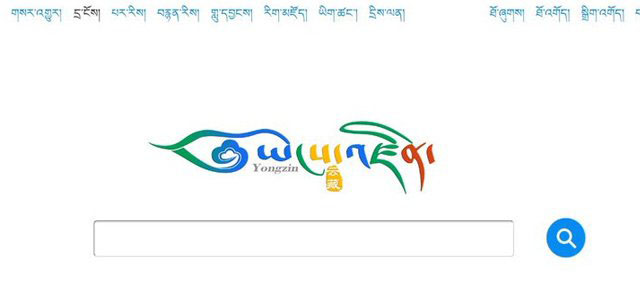
(TibetanReview.net, Aug26, 2016) – China’s first Tibetan-language search engine launched this week bears a striking resemblance to the Google search engine in the USA which is blocked locally and brings up considerably more limited results, revealing it to be nothing more than a tool of censorship and propaganda.
The search engine, yongzin.com, hardly brings results the surfer looks for but only what the government of China wants to show. Nevertheless, China’s official Xinhua news agency Aug 22 said the search engine’s aim was to be a “unified portal for all major Tibetan-language websites in China.”
A quick image search for the Dalai Lama, for example, requires sifting through pages of results before locating any of the man that Chinese authorities have previously dubbed a “jackal in Buddhist monk’s robes,” noted a blogs.wsj.com posting Aug 24. Instead, users are offered photos of various Tibetan artifacts and images of official press briefings, as well as an image of former French President Nicolas Sarkozy adorned with the words, “Tibet is a part of China,” it added.
Searching for “Dalai Lama” doesn’t show the Tibetan spiritual leader-in-exile’s official website, reported qz.com Aug 24. Rather, surfers are routed to an array of Chinese government-backed sites, including vtibet.com, which is bannered with slogans such as, “To manage our country, we need to first manage our borders. In order to manage our borders, we should first stabilize Tibet” and “Without the Communist Party, there would be no socialist New Tibet,” said the blogs.wsj.com posting.
Likewise, searching “Free Tibet” in Tibetan on Yongzin brings up a 2014 People’s Daily article about “illegal publications” related to Tibet and Xinjiang independence as the top result, said the qz.com report, citing a researcher from London-based NGO Tibet Watch who wished to remain anonymous. The same search on Google was reported to show results about several Tibetan advocacy groups.
The report said even more innocuous terms like “Tibetan tea” appeared to be censored. Searching for the term on Yongzin’s image search yields mostly photos of Chinese officials drinking tea, it added.
The report said Françoise Robin, a Tibetan studies professor at the Paris-based National Institute of Oriental Languages and Civilizations, ran a series of side-by-side comparisons with Google and noticed that they turned up markedly different results. A Tibetan-language search for “Tibetan independence” in Google, for example, had around 730 results, while Yongzin.com turned up nothing.
“I think they realize most Tibetans now are bypassing the Great Firewall [through virtual private networks]” and turning to sources like Google and Wikipedia, Ms Robin was quoted as saying. “I think authorities realize they have to compete.”
“The main political effect of this initiative is that it allows China’s government to position itself as a defender of Tibetan culture and heritage,” Alistair Currie, a spokesperson with London-based advocacy group Free Tibet, was quoted as saying. “However, as with everything in Tibet, language is tainted with political connotations, and Beijing wants to control any development rather than allow it to flourish uncontrolled.”
She says there is a growing number of blogs, websites, and social media in Tibetan originating from Tibet, but none of it is accessible through the new search engine.
China’s state media said the search engine was developed by the Qinghai Province Hainan Prefectural Tibetan Information Technology Research Center and developed over the course of more than three years at a cost of 57 million yuan (US $8.7 million).


